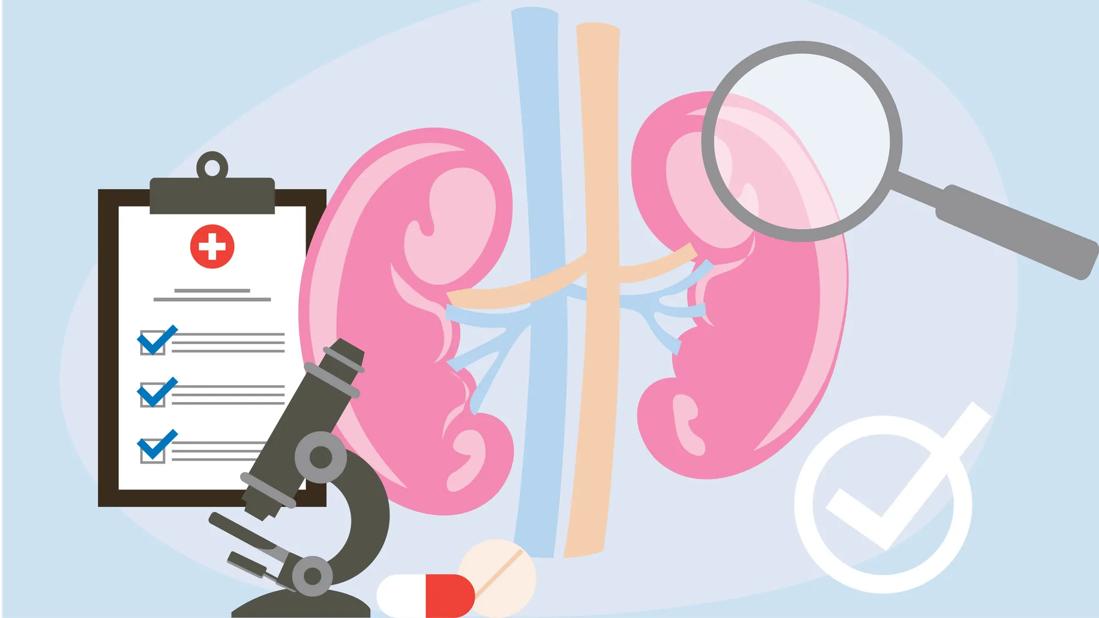You may not notice any symptoms of kidney disease until later stages

Image content: This image is available to view online.
View image online (https://assets.clevelandclinic.org/transform/8f9aba9c-f6a3-44db-8605-ef87ecc5cfd1/kidney-Disease-Diagnosis-1366379079-770x533-1_jpg)
Kidneys along with a microscope, magnifying glass and clipboard showing diagnosis of kidney disease.
Often, it comes out of the blue. You felt fine. But the doctor said they found protein in your urine. Or that you have high levels of creatinine in your blood. That your biopsy confirmed you have kidney disease.
Advertisement
Cleveland Clinic is a non-profit academic medical center. Advertising on our site helps support our mission. We do not endorse non-Cleveland Clinic products or services. Policy
And now you’re wondering what happens next. What’s it going to feel like living with IgA nephropathy or C3G?
“A lot of times, people have kidney disease and don’t even know it,” says nephrologist Jonathan Taliercio, DO. “Particularly if you’re living with mild or moderate kidney disease, you could be totally asymptomatic.”
But over time, your kidney disease may worsen, and you may find that you start feeling the effects of living with kidneys that aren’t pulling their weight anymore.
Or maybe you won’t. Not everyone who has IgA nephropathy (IgAN) or C3G will have a worsening of their kidney disease. For some people, it can clear up on its own with time. For others, their disease will be kept well in check by medication.
But if symptoms start to rear up, it can help if you know what to expect ahead of time. Dr. Taliercio explains what symptoms you may expect when you’re living with IgA nephropathy or C3G and how to slow the progress of kidney disease.
Kidney disease severity is classified into five different stages. Each stage is associated with your estimated glomerular filtration rate, a measure of how well your kidney filters substances. Stage 1 is very mild, while stage 5 is kidney failure — when your kidneys have failed or are close to failing. Stage 5 is the time when your provider will recommend beginning dialysis or seeking a kidney transplant, if those are your wishes. (Note that you can be eligible to join the National Kidney Transplant Waiting list when you have stage 4 kidney disease.)
Advertisement
Dr. Taliercio says many people won’t have any symptoms of kidney disease until they reach stage 5. But some people may notice symptoms beginning in stage 3.
“Oftentimes, the symptoms you feel associated with kidney diseases like IgA nephropathy or C3G come from a buildup of toxins that your kidneys can no longer clear out, which tend to not be noticeable until you reach kidney failure,” Dr. Taliercio notes.
Kidney failure can feel different for different people. Among the most common symptoms are:
For some people, IgA nephropathy or C3G progresses quickly. For others, the disease moves slowly over a longer period of time. Early diagnosis can give you and your provider more opportunity to help slow the progress of the disease.
Your kidneys do a lot of work that impacts your whole body. So, managing IgAN or C3G is often a matter of managing other conditions that pop up as a result of reduced kidney function.
“One of the most common complications of kidney disease is high blood pressure,” Dr. Taliercio states. “Managing your blood pressure is very important to slowing the loss of kidney function.”
Other conditions associated with IgAN, C3G and other kidney diseases include:
Lower kidney function puts you at higher risk for the above conditions, and, if not controlled, may require you to start dialysis sooner.
After being diagnosed with IgA nephropathy or C3G, you should visit your provider regularly to assess your kidney function, as well as your overall health. If you’re living with a chronic condition or are at risk of developing one, your provider will likely prescribe medications and suggest lifestyle changes, like certain adjustments to your diet and exercise routine, to manage those conditions and lessen the burden on your kidneys.
Following a low-sodium diet can also help to lessen the burden of kidney disease on the rest of your body.
No one wants to live with kidney disease. No one wants to have to consider a future of dialysis or having a transplant. But if you’ve been diagnosed with IgA nephropathy, C3G or another kidney disease, talk with your provider about any steps you can take to slow its progression and minimize its effects on your life.
Advertisement

Sign up for our Health Essentials emails for expert guidance on nutrition, fitness, sleep, skin care and more.
Learn more about our editorial process.
Advertisement
These kidney diseases may require some lifestyle changes, but the renal diet isn’t always necessary
Expect some new prescriptions, as well as recommendations to avoid some medications
Low-sodium and nutrient-rich foods are your best bets
Most recommended precautions center around minimizing bruising or swelling
Even one drink can have an impact on your cognitive function leading to slurred speech, blurred vision and impaired memory
Understand who may (and may not) benefit
Type 2 diabetes isn’t inevitable with these dietary changes
Applying a hot or cold compress can help with pain
Pump up your iron intake with foods like tuna, tofu and turkey